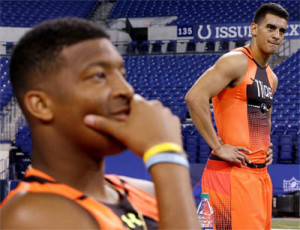The NFL Personality Analysis Method is a new niche of scouting and player evaluation. More than most any other sport, football is a team-centric game. Moneyball analytics haven’t successfully translated from baseball to football because football is a team sport. Winning football requires all 11 guys to be in sync, doing their job, having each other’s back and executing the gameplan. In order for that to happen you need the right people with the right temperament makeup. During the many decades of NFL football clear patterns have emerged and shown us specific temperament that result in winning Super Bowls. Also it is clear that drafting physical traits without understanding the temperament personality is like flying blind. Because of this many teams have drafted busts in the first round. Drafting busts costs millions of dollars and wasted time. This can be minimized or even avoided and GMs can now strategically build winners. Everyone can evaluate a 40-time but the money is now on temperament evaluation. This is how championships are won. Our new tool to determines the temperament makeup to NFL teams an edge.
Two busts that the NFL PAM easily picked out was Cordarrelle Patterson and Johnny Manziel. Manziel COULD have a bright future IF he decides to start caring about his team instead of himself. Manziel’s personality weakness is indifference and Patterson’s is lawlessness (as in ‘rules are for other people, not me’). This is why Patterson runs a go route instead of the button hook as designed by the called play.
“The quarterback is the leader of the team” is incorrect. The coach is the leader of the team. The quarterback must execute the leader’s gameplan. The coach is the CEO and the QB is the COO. Our research shows that successful NFL QB temperaments can stay cool under pressure and can also execute a coach’s offensive system. They take commands and carry out the coach’s orders. They fail when they crack under pressure or decide to ignore the coach and do whatever they want. The larger ‘personality family (PF)’ that Peyton Manning belongs to never had a Super Bowl win until he won. Why? Because his temperament type is overly intense, not calm, and wants to be the CEO instead of the coach. His temperament type can make an excellent NFL coach. This type of QB is an ‘uncoachable subordinate’ and that won’t be tolerated by a strong coach (this is why Ryan Mallet got the boot). As winning covers almost all flaws, Peyton’s coaches have allowed for Peyton (the COO) to act as the CEO. This accommodates Peyton’s demand for control. Meanwhile Tom Brady is totally different and his temperament is a more natural fit for the NFL QB ‘COO’ position as he demands less control than Manning. Also Brady is able to stay emotionally much more cool than Peyton. This too makes him a better fit to deal with the stress of playing QB and to carry out the coach’s game plan. Obviously both are winners but it is these differences that win Super Bowls. (late Jan 2016 Super Bowl update: the Denver defense is carrying Manning and a strong defense allows for a game manager to win Super Bowls. Peyton’s negative intensity shows up as his playoff numbers are worse than regular season number. This shows he is pushing too hard.)
How does this impact winning games? Because football is a truly a team game and it’s a uniquely human game. Temperaments matter as the roles people play (coach, QB, WR, TE and so on) are depending on each other to be successful. The emotional, relational and psychological aspects of a player matters as much as physical ability and the team’s offensive system. Our ongoing research continues to reaffirm this finding. Additionally historical precedent gives us a new level of insight into how that player will processes these aspects of NFL football – relationships, stress, failure, submitting to the coaches authority and even how the live game itself is processed in real-time. The difference between busts, good and great players is the ability to mentally process the game in a specific way. While there are many examples that the PAM could have easily predicted, one example of failure is RG3. RG3’s mental makeup had no historical precedent of success and for good reason too as our RG3 article discusses.
A later article “A Tale of Two Mannings” uncovers why Peyton’s stats drop in the playoffs, while Eli’s go up. Hint: it is linked to how they perceive and process stress. Our research shows this was easily predictable and Eli belongs to a temperament family that is more statistically favorable at winning Super Bowls than his brother.
Stay tuned as we will briefly cover a list of college QBs before the 2016 draft.
